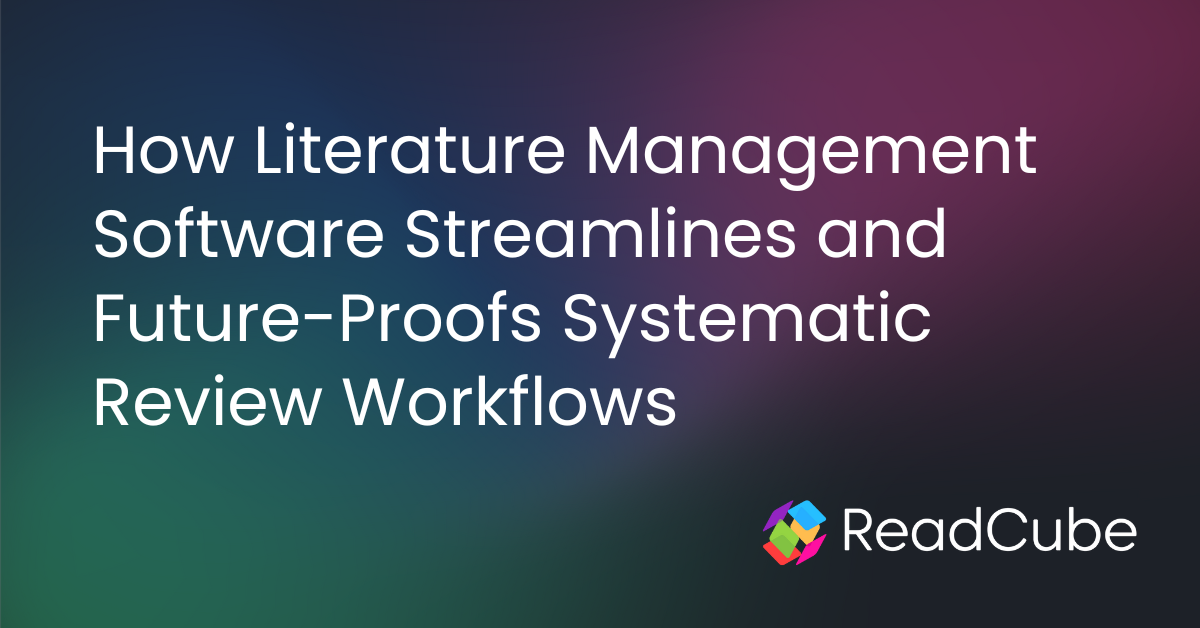How Literature Management Software Streamlines and Future-Proofs Systematic Review Workflows

The volume of published scientific and medical articles has exploded over the years, making the systematic literature review (SLR) process challenging for research organizations. They must review tens of thousands of research findings, often using disparate tools and manual workflows.
The National Library of Medicine reports that SLRs can cost research organizations hundreds of thousands of dollars annually. That’s because completing manual SLR workflows increases the chances of errors and slows internal productivity.
Literature management software (LMS) solutions can make the stages of a systematic review workflow more affordable, efficient, organized, and accurate. In this guide, we’ll explain how LMS platforms help you quickly find the right literature in the review process and set your business up for long-term success.
What is a Systematic Literature Review workflow?
Systematic literature review workflows are rigorous, evidence-based processes involving multiple subject matter experts within an organization. These experts meticulously evaluate research findings to align and agree on answers to specific research questions. Whether SLR workflows are manual or automated using literature review management software, they follow strict methodologies to ensure reproducible and unbiased outcomes.
How Literature Management Software Improves Workflows
Literature management software for systematic reviews can help organizations streamline and future-proof the process by:
Automating manual or disparate tools
Excel spreadsheets are often used to track and organize documents in manual systematic literature processes. Businesses also import documents from one platform into another to evaluate the relevance of research findings at different literature review stages. This complex and time-consuming workflow is no longer sustainable, given that thousands of articles come out weekly.
Integrated systematic review automation tools like ReadCube streamline the SLR process—from identifying and retrieving documents to managing references and shared libraries, screening and reviewing references, and creating reports using PRISMA charts and citation software.
Decreasing internal costs
Organizations save money by reducing the time investment required to complete the process— while boosting team productivity—when they automate and integrate the multi-stage workflow using one systematic review tool.
Facilitating team collaboration
Multiple reviewers may have conflicting opinions about whether an article should be included in a systematic literature review. Research workflow management solutions make it easy to spot conflicts and automatically flag them to reviewers, allowing teams to connect and make a group decision while ensuring productive collaboration.
Teams can also create and share project and reference libraries within some LMS platforms. Likewise, team leads can assign specific projects and literature reviews to colleagues directly from the LMS solution. Once a literature review is complete, team leads can email included references directly to colleagues to create reports and presentations.
Reducing the chance of errors
LMS solutions streamline and simplify industry-standard review procedures, reducing the risk of errors and improving team efficiencies. The accuracy and scalability provided by a single automated SLR workflow can also improve the discovery of novel solutions, such as drug discovery in the pharmaceutical sector.
Leveraging AI developments
Some LMS solutions now offer configurable AI capabilities to future-proof and support organizations with increasing volumes of information and stringent regulatory demands.
The Future of Systematic Literature Reviews
LMS platforms help you navigate the challenges of increasing article volumes and regulatory demands, ensuring better systematic literature review management. Literature Review by ReadCube is a systematic, simplified end-to-end platform that can streamline these workflows with efficiency and automation to set your business up for long-term success.
The ReadCube platform also improves team collaboration and reduces systematic literature review process errors. Furthermore, ReadCube customer support can help businesses set up custom workflows to optimize their systematic literature review software outcomes.
Download ReadCube’s “Future of Systematic Literature Reviews” white paper to learn more.